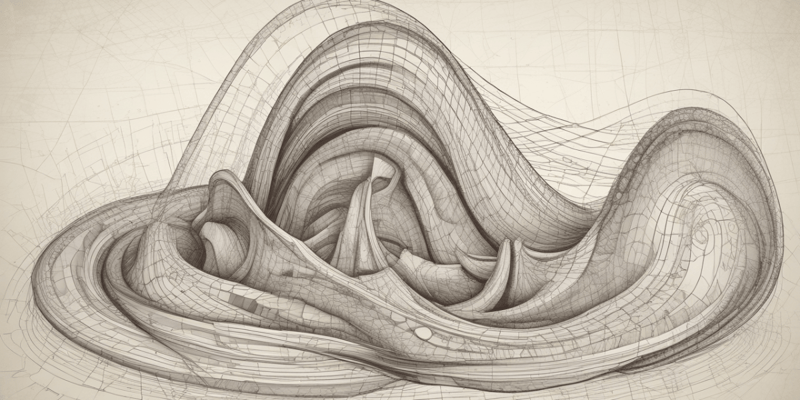Questions and Answers
What defines a second-order derivative?
The derivative of the first derivative
In calculus, what real-world concept can be determined using derivatives of position functions?
Velocity and acceleration
What aspect of a function can be analyzed by examining its first derivative?
Maxima and minima
What is the primary purpose of using implicit differentiation in calculus?
Signup and view all the answers
Which rule is essential for finding derivatives of composite functions?
Signup and view all the answers
What is the derivative of a constant function?
Signup and view all the answers
When using implicit differentiation, what do we differentiate simultaneously?
Signup and view all the answers
What is the derivative of a power function?
Signup and view all the answers
Which trigonometric function has a derivative equal to its negative counterpart?
Signup and view all the answers
What does the chain rule help us find the derivative of?
Signup and view all the answers
Study Notes
Differentiation: A Foundation for Calculus
Differentiation, a fundamental concept in calculus, is the process of finding the rate of change of a function with respect to a variable. This practice allows us to analyze the behavior of functions, create models, and solve practical problems in various fields such as physics, engineering, and economics. In this article, we'll delve into the world of differentiation, exploring higher order derivatives, applications of derivatives, implicit differentiation, and derivatives of standard functions, along with the essential chain rule.
Higher Order Derivatives
A derivative is the slope of a tangent line to a function at a specific point. Higher order derivatives are the derivatives of the derivatives themselves. For instance, a second-order derivative (also known as the second derivative) is the derivative of the first derivative, and a third-order derivative (third derivative) is the derivative of the second derivative, and so on.
Applications of Derivatives
Calculus' primary goal is to solve real-world problems, and differentiation is no exception. Derivatives are used to find:
- Velocity and acceleration: Derivatives of position functions are used to find velocity and acceleration in physics.
- Optimization: Maxima and minima of functions can be found by examining their first derivatives.
- Elasticity: In economics, derivatives are used to calculate the responsiveness of demand or supply to price changes.
Implicit Differentiation
Implicit functions are functions that cannot be expressed in explicit form, i.e., they are not written as (y = f(x)). In these cases, we use implicit differentiation to find the derivative of the function with respect to (x). Implicit differentiation involves differentiating both sides of an implicit equation simultaneously.
Derivatives of Standard Functions
For many common functions, we can find their derivatives without calculating the limit of the difference quotient. Some standard derivatives include:
- Constant function: (d(c)/dx = 0)
- Linear function: (d(ax + b)/dx = a)
- Power function: (d(x^n)/dx = nx^{n-1})
- Exponential function: (d(e^x)/dx = e^x)
- Logarithmic function: (d(\log_a(x))/dx = 1/x\ln(a))
- Trigonometric functions: (d(\sin(x))/dx = \cos(x)) and (d(\cos(x))/dx = -\sin(x)).
Chain Rule
The chain rule is a fundamental method used to find the derivative of composite functions, i.e., functions composed of other functions. If (y = f(u)) and (u = g(x)), then the derivative of (y) with respect to (x) is given by: (dy/dx = f'(u) \cdot g'(x)). The chain rule is a practical tool for finding derivatives of complex functions.
Differentiation is an essential tool that helps us understand the world around us and develop mathematical models to explain and predict phenomena. This article merely scratches the surface of this fascinating topic, but it should provide a solid foundation for a deeper understanding of differentiation in calculus.
Studying That Suits You
Use AI to generate personalized quizzes and flashcards to suit your learning preferences.
Description
Explore the fundamental concept of differentiation in calculus, the process of finding the rate of change of a function with respect to a variable. Delve into higher order derivatives, applications of derivatives in physics and economics, implicit differentiation, derivatives of standard functions, and the chain rule for composite functions.




